Prime Minister Narendra Modi on Saturday held a bilateral meeting with Angolan President Joao Manuel Goncalves Lourenco at Hyderabad House in New Delhi, extending warm congratulations to Angola for assuming the chairmanship of the African Union and highlighting the historic bond between the two nations.
Addressing a joint press conference alongside President Lourenco, Prime Minister Modi said, "India and Angola are celebrating the 40th anniversary of their bilateral ties. However, our relationship goes much further back, to a time when Angola was fighting for its freedom, and India supported it with full faith and friendship."
Congratulating Angola on leading the African Union, the Prime Minister added, "It is a matter of pride for us that during India's G20 presidency, the African Union secured permanent membership of the G20. India and African countries raised their voices together against colonial rule. Today, we continue to speak in unison for the Global South -- its hopes, expectations, and aspirations."
The Prime Minister highlighted the increasing momentum in India-Africa cooperation over the past decade, noting that mutual trade has reached nearly $100 million.
He also emphasised the growing collaboration in Defence and maritime security, particularly referencing last month's first-ever India-Africa Naval Maritime Exercise.
"In the past ten years, we have opened 17 new Embassies across Africa. India has extended over $12 billion in credit lines to African nations and provided $700 million in grants," PM Modi said, adding that vocational training centres have been established in eight African countries, and partnerships in digital public infrastructure are ongoing in five more.
Highlighting India's consistent support in times of need, he said, "India has stood shoulder to shoulder with the people of Africa as a first responder during disasters. We see the African Union as a partner in progress and as a pillar of the Global South."
He also noted India's significant role as a key buyer of Angola's gas and oil and expressed readiness to assist in training Angola's armed forces. He said India would share its expertise in digital public infrastructure, space technology, and capacity building with Angola.
"Today, we also decided to strengthen our ties in healthcare, diamond processing, fertilisers, and critical minerals," he said, while also acknowledging the popularity of Yoga and Bollywood in Angola as symbols of the cultural strength of the relationship. To further bolster people-to-people ties, he announced the launch of a youth exchange programme.
In his address, President Lourenco said, "I have come to India to convey a message of admiration and friendship for your country, whose history is rich in cultural, scientific, technological, and political achievements on the global stage."
Outlining Angola's vision for the future of bilateral ties, he said, "We want relations grounded in concrete, achievable objectives with practical outcomes that will impact the lives of our people."
He stressed that Angola would prioritise sectors such as agriculture, finance, health, Defence, higher education, IT, energy, trade, and mineral resources in its cooperation with India.
He emphasised Angola's interest in deeper economic engagement, saying, "We attach great importance to the direct participation of Indian investors in the Angolan economy, which offers growth potential and attractive conditions."
The meeting marked a significant step forward in India-Angola relations, reinforcing shared goals across the spheres of development, energy security, cultural exchange, and solidarity within the Global South.

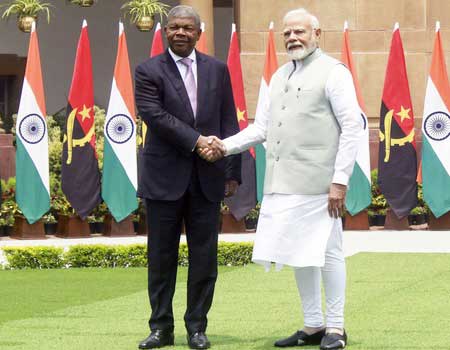
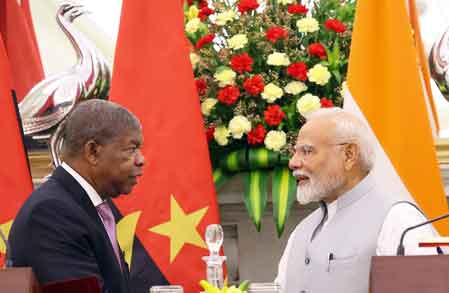
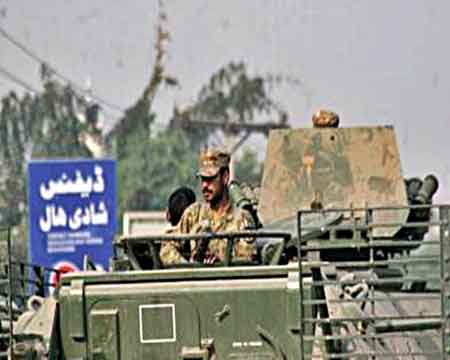
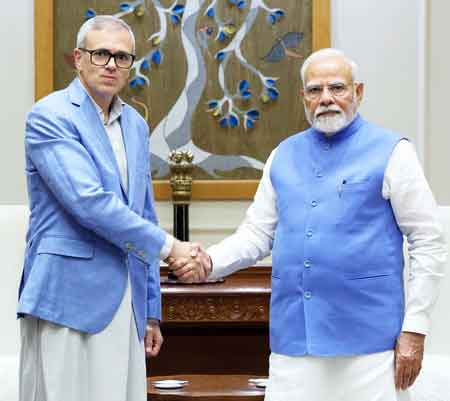
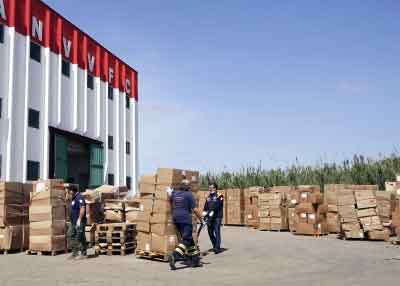
India and Angola expand energy partnership, sign key agreements to strengthen bilateral ties
India and Angola on Saturday signed several key agreements following the bilateral meeting between Prime Minister Narendra Modi and Angolan President Joao Manuel Goncalves Lourenco at the Hyderabad House in New Delhi.
Pakistan faces critical artillery shortage, can sustain war for just four days
Pakistan’s military readiness has come under severe scrutiny, with intelligence sources revealing that the country can sustain high-intensity combat operations for no more than four days.
Omar Abdullah meets PM Modi in aftermath of Pahalgam terror attack
Jammu and Kashmir Chief Minister Omar Abdullah on Saturday met Prime Minister Narendra Modi in New Delhi to discuss the security situation in the Union Territory in the aftermath of the Pahalgam terrorist attack in which 26 civilians, mostly tourists, were killed.
Pahalgam attack: India now suspends inbound mails and parcels from Pakistan
The Centre on Saturday announced to suspend exchange of inbound mails and parcels from Pakistan via air and surface routes, after banning all imports and barring Pakistani-flagged vessels from entering the ports earlier in the day.
Deeply worried about increasing Chinese influence on Pakistan: Former US NSA
NSA to the US President Donald Trump from 2018-2019, Bolton emphasised that the terror threat has returned to the region following the withdrawal of the US forces from Afghanistan, thus making sure that Washington remains "very interested" in Af-Pak for "eminently good reasons".
Pakistan unleashes trolls on JK-based Indian military officials, faces heat
Fanning war hysteria, Pakistan has unleashed its army of misinformation creators and ISI-linked trolls to push a narrative that top Indian military officers were penalised for alleged lapses leading to the Pahalgam terror strike – a charge emphatically denied by the establishment in New Delhi on Saturday.
Indus Treaty suspension: Pakistan should realise threatening neighbours does lead to consequences, says former US NSA
India's decision to put the 1960 Indus Waters Treaty (IWT) in abeyance after the April 22 Pahalgam terror attack should send a strong message to Pakistan that engaging in activities that threaten their neighbours does lead to consequences,
India has 'legitimate right' to act in self-defence against Pakistan: Former US NSA
John Bolton, the US National Security Advisor (NSA) to the US President Donald Trump from 2018-2019 and a former US Ambassador to the United Nations, has said that even though nobody wants to see a wider conflict in South Asia,